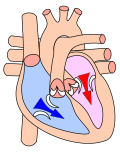Systole
Systole is the part of the cardiac cycle during which the heart contracts and pumps blood from the chambers into the arteries. This term is usually used in reference to the action of the ventricles.
Overview[edit]
The process of systole involves the contraction of the heart muscles, specifically the ventricles, to pump blood into the body's circulatory system. This is in contrast to diastole, the phase of the cardiac cycle during which the heart relaxes and fills with blood.
Phases of Systole[edit]
Systole is divided into two phases: isovolumetric contraction and ventricular ejection.
Isovolumetric Contraction[edit]
During isovolumetric contraction, the ventricles begin to contract with the closure of the mitral valve and tricuspid valve, which prevents backflow of blood into the atria. However, the aortic valve and pulmonary valve are also closed, so the blood volume in the ventricles remains constant.
Ventricular Ejection[edit]
In the ventricular ejection phase, the aortic and pulmonary valves open due to the increased pressure in the ventricles. Blood is then ejected from the ventricles into the aorta and pulmonary artery.
Measurement[edit]
The duration of systole can be measured using an electrocardiogram (ECG), which records the electrical activity of the heart. The QRS complex on an ECG corresponds to the depolarization of the ventricles, which initiates systole.
Clinical Significance[edit]
Abnormalities in systole can lead to various heart conditions. For example, systolic heart failure occurs when the heart is unable to pump blood effectively during systole. Systolic hypertension refers to high blood pressure during systole.
See Also[edit]
| Cardiac cycle | ||||||||||
|---|---|---|---|---|---|---|---|---|---|---|
This Cardiac cycle related article is a stub.
|
| Cardiovascular system physiology | ||||||||||
|---|---|---|---|---|---|---|---|---|---|---|
This Cardiovascular system physiology related article is a stub.
|
Ad. Transform your life with W8MD's Budget GLP-1 injections from $49.99


W8MD offers a medical weight loss program to lose weight in Philadelphia. Our physician-supervised medical weight loss provides:
- Weight loss injections in NYC (generic and brand names):
- Zepbound / Mounjaro, Wegovy / Ozempic, Saxenda
- Most insurances accepted or discounted self-pay rates. We will obtain insurance prior authorizations if needed.
- Generic GLP1 weight loss injections from $49.99 for the starting dose of Semaglutide and $65.00 for Tirzepatide.
- Also offer prescription weight loss medications including Phentermine, Qsymia, Diethylpropion, Contrave etc.
NYC weight loss doctor appointmentsNYC weight loss doctor appointments
Start your NYC weight loss journey today at our NYC medical weight loss and Philadelphia medical weight loss clinics.
- Call 718-946-5500 to lose weight in NYC or for medical weight loss in Philadelphia 215-676-2334.
- Tags:NYC medical weight loss, Philadelphia lose weight Zepbound NYC, Budget GLP1 weight loss injections, Wegovy Philadelphia, Wegovy NYC, Philadelphia medical weight loss, Brookly weight loss and Wegovy NYC
|
WikiMD's Wellness Encyclopedia |
| Let Food Be Thy Medicine Medicine Thy Food - Hippocrates |
Medical Disclaimer: WikiMD is not a substitute for professional medical advice. The information on WikiMD is provided as an information resource only, may be incorrect, outdated or misleading, and is not to be used or relied on for any diagnostic or treatment purposes. Please consult your health care provider before making any healthcare decisions or for guidance about a specific medical condition. WikiMD expressly disclaims responsibility, and shall have no liability, for any damages, loss, injury, or liability whatsoever suffered as a result of your reliance on the information contained in this site. By visiting this site you agree to the foregoing terms and conditions, which may from time to time be changed or supplemented by WikiMD. If you do not agree to the foregoing terms and conditions, you should not enter or use this site. See full disclaimer.
Credits:Most images are courtesy of Wikimedia commons, and templates, categories Wikipedia, licensed under CC BY SA or similar.
Translate this page: - East Asian
中文,
日本,
한국어,
South Asian
हिन्दी,
தமிழ்,
తెలుగు,
Urdu,
ಕನ್ನಡ,
Southeast Asian
Indonesian,
Vietnamese,
Thai,
မြန်မာဘာသာ,
বাংলা
European
español,
Deutsch,
français,
Greek,
português do Brasil,
polski,
română,
русский,
Nederlands,
norsk,
svenska,
suomi,
Italian
Middle Eastern & African
عربى,
Turkish,
Persian,
Hebrew,
Afrikaans,
isiZulu,
Kiswahili,
Other
Bulgarian,
Hungarian,
Czech,
Swedish,
മലയാളം,
मराठी,
ਪੰਜਾਬੀ,
ગુજરાતી,
Portuguese,
Ukrainian






